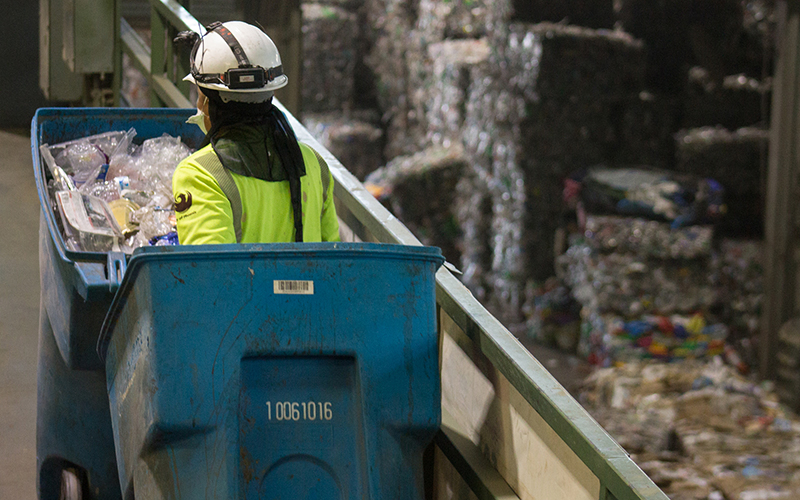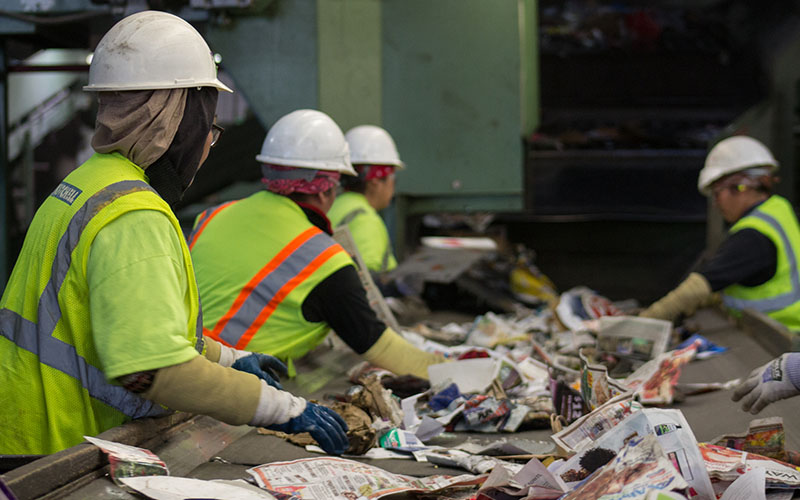
Cities across the country have been scrambling to keep plastics out of landfills since China, a major buyer of recycled products from major U.S. cities, banned import of some kinds of plastic trash. (Photo by Miles Metke/Cronkite News)
PHOENIX – A new recycling ban goes into effect June 1 in Flagstaff as the city looks for ways to deal with China’s recent ban on the importation of several kinds of plastic.
Flagstaff residents have been able to recycle any type of rigid plastic with recycling-symbol numbers 1 through 7. Now the city only will accept numbers 1 and 2 in curbside bins.
“A lot of people feel really good when they use their recycling bin, right? They’re not throwing something into a landfill,” said Dylan Lenzen, zero waste coordinator in Flagstaff. “But they also don’t get the full story when they throw something that isn’t recyclable into the recycling bin.”
He anticipates the change will be hard on residents who have been recycling for decades.
“And it gets really, really confusing once we go down the rabbit hole of numbers, and so it’s easier for us to communicate recycling by shape. Essentially narrow down the types of shapes you can recycle to bottles, jugs and jars,” Lenzen said.
“Prior to this point in time, we told people they could recycle all kinds of rigid plastics, so anything that held its shape when you squeezed it to now communicating the fact that the only types of rigid plastic you can recycle are plastic bottles, plastic jugs and plastic jars like peanut butter jars and stuff like that.”
The policy was changed because China, a major purchaser of recycled products from Flagstaff and other U.S. cities, has stopped importation of two-dozen types of plastic scraps, citing the need to reduce environmental pollution. Before the ban, China purchased roughly half the world’s plastic and paper recyclables, Lenzen said, and the international recycling market is in a tailspin seeking alternatives to filling landfills with plastic.
The city has worked with Norton Environmental to sort and sell Flagstaff’s recyclables, but since China’s ban, Norton has been unable to find buyers for these types of plastic. Lenzen said Flagstaff is not alone, as many other cities across the country have been forced to remove items from their acceptable materials list or send significant amounts of formerly recyclable materials to the landfill.
Lenzen also said China’s decision to ban certain types of recyclables puts U.S. cities in a predicament. There is a bigger problem here: How do cities address a growing problem of material consumption and contamination in the world’s recycling stream?
Lenzen said Flagstaff residents, and recyclers across the U.S., are putting more recyclables in their bins, but they also increasingly have been throwing more non-recyclable items into their bins. The result is that more recyclable items get sent to the landfill as contaminated.
This story is part of Elemental: Covering Sustainability, a new multimedia collaboration between Cronkite News, Arizona PBS, KJZZ, KPCC, Rocky Mountain PBS and PBS SoCal.
Sign up for CRONKITE DAILY to catch up on the latest news.
